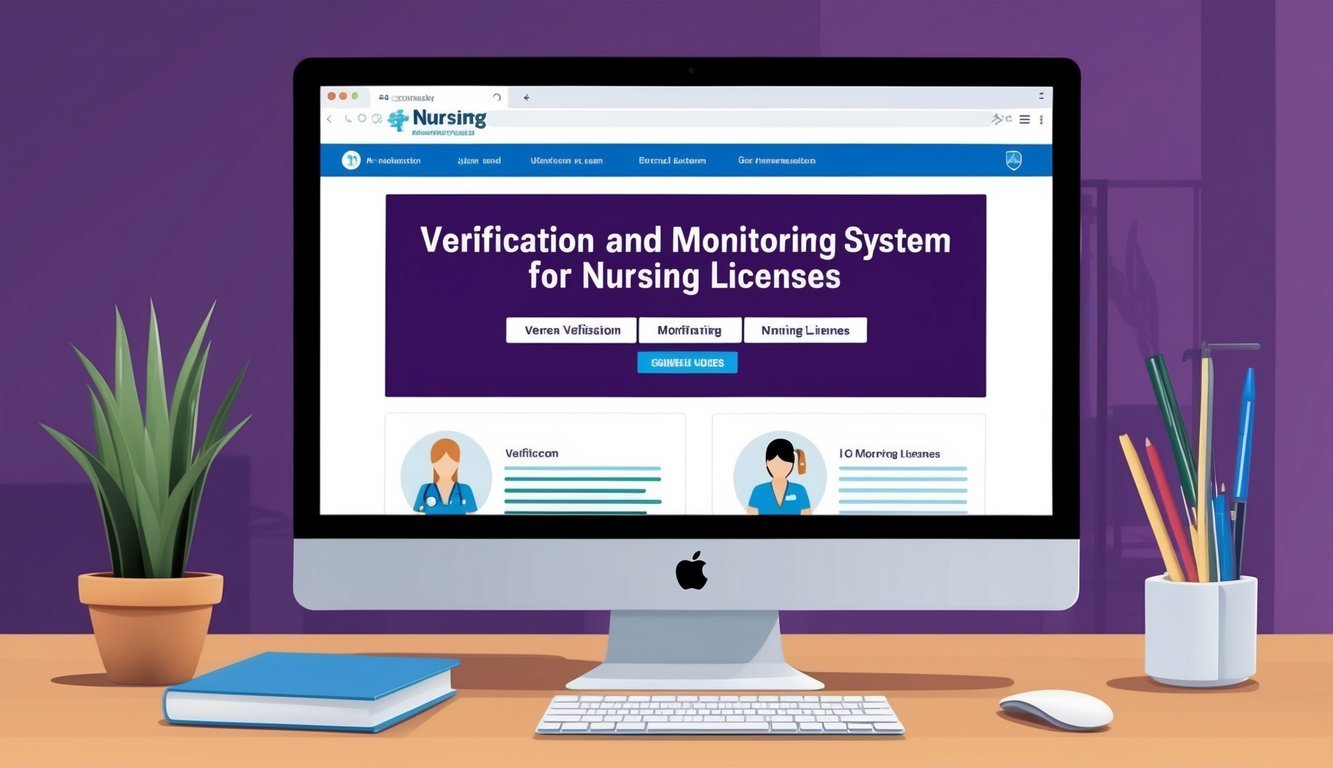In North Carolina, a registered nurse (RN) license is essential for your nursing career.
The NC RN license allows you to practice nursing legally in the state.
It also ensures you meet the required standards for healthcare professionals.
Understanding the licensure process and what it entails is crucial for anyone looking to advance their nursing career in North Carolina.
To get your license, you must complete an approved nursing program and pass the National Council Licensure Examination (NCLEX-RN).
Once you secure your RN license, staying informed about the renewal process and maintaining your credentials is important for continued practice.
If you’re considering practicing in North Carolina or need to understand the requirements better, this guide will provide vital information.
It will help you navigate through the steps, from licensure to renewal, effectively positioning yourself for success in your nursing career.
Key Takeaways
- The NC RN license is necessary for practicing nursing in North Carolina.
- You must complete an approved nursing program and pass the NCLEX-RN exam.
- Staying informed about license renewal and maintenance is vital for ongoing practice.
Overview of North Carolina Nursing Licensure
North Carolina offers various nursing licenses regulated by the North Carolina Board of Nursing (NCBON).
Understanding these licenses and the NCBON’s role is essential for any nursing professional in the state.
Types of Nursing Licenses
In North Carolina, you can obtain three main types of nursing licenses: Registered Nurse (RN), Licensed Practical Nurse (LPN), and Medication Aide.
| License Type | Description |
|---|---|
| Registered Nurse (RN) | Provides comprehensive patient care, education, and support. Requires a Bachelor of Science in Nursing or an Associate Degree. |
| Licensed Practical Nurse (LPN) | Offers basic nursing care under the supervision of an RN or doctor. Must complete a practical nursing program. |
| Medication Aide | Assists in administering medications. Usually requires completion of a specific training program. |
Each license has different educational requirements and scopes of practice.
Familiarizing yourself with these distinctions is crucial for your nursing career.
The Role of the North Carolina Board of Nursing
The North Carolina Board of Nursing (NCBON) regulates nursing practice and ensures public safety.
It oversees the licensing process for RNs, LPNs, and Medication Aides.
Your application for licensure must go through the NCBON for review and approval.
They verify your eligibility based on education and any required exams.
The NCBON also handles renewals and continuing education requirements.
For example, RNs and LPNs need to renew their licenses every two years.
Keeping up with these regulations helps maintain the nursing profession’s integrity and safety across the state.
By understanding the roles and responsibilities of the NCBON, you can better navigate your nursing career in North Carolina.
For more details, visit the North Carolina Board of Nursing.
Licensure Process
The licensure process in North Carolina involves several key steps for newly licensed nurses and those seeking licensure by endorsement.
Understanding these requirements helps ensure a smooth transition into your nursing career.
Initial Licensure for Newly Licensed Nurses
To obtain your North Carolina RN license, you must first complete an approved nursing program.
This could be an Associate Degree in Nursing (ADN) or a Bachelor of Science in Nursing (BSN).
After finishing your education, you need to register for the NCLEX-RN exam.
The fee for this exam is generally around $200.
You must pass this exam to gain your license.
Once you pass, you can submit your application to the North Carolina Board of Nursing.
You can complete this application online.
The Board will review your documents and issue your license if everything is in order.
Licensure by Endorsement
If you are already licensed in another state and wish to practice in North Carolina, you’ll need to apply for licensure by endorsement.
This process starts by contacting the North Carolina Board of Nursing for the application.
You will need to provide proof of your current license and education.
This includes sending transcripts and proof of passing the NCLEX or an equivalent exam.
You will also need to pay any applicable fees.
The application typically requires 4 to 6 weeks for processing.
If you meet all criteria, you can receive your North Carolina RN license and join the workforce.
Criminal Background Check
All applicants for nursing licensure in North Carolina must undergo a criminal background check.
This is a key part of ensuring public safety.
You will need to submit your fingerprints through an approved vendor.
The cost of this check can vary but typically falls around $38.
The Board will evaluate any criminal history as part of your application.
Certain offenses may impact your ability to obtain a license.
You can find the complete list of disqualifying offenses on the North Carolina Board of Nursing’s website for further details.
License Renewal and Maintenance
Maintaining your North Carolina registered nurse (RN) license is crucial for your professional practice.
This involves understanding the requirements for renewal and the stipulations for multi-state licensure.
Continuing Competence Requirements
To renew your RN license in North Carolina, you must demonstrate continuing competence.
This means showing that you have enhanced your nursing skills and knowledge since your last renewal.
You need to complete a minimum of 30 hours of continuing education within the renewal period.
You should keep your records handy, as you will need to provide proof if requested by the North Carolina Board of Nursing.
Additionally, if you have a name change, ensure that your updated details are submitted during the renewal process.
You may need to provide legal documents to support this change.
For more details on continuing education requirements, visit the North Carolina Board of Nursing.
Multi-State Licensure
If you work in multiple states, a multi-state license can simplify your practice.
North Carolina participates in the Nurse Licensure Compact (NLC), which allows you to hold one license while practicing in other compact states.
To be eligible for a multi-state license, you need to meet certain requirements.
These include having a valid Social Security number and a background check.
Remember that your primary residence must be in North Carolina for this to apply.
If you move to another state, you will need to comply with the licensing rules of that state.
For more specific information regarding multi-state licensure, check the NCBON.
Verification and Monitoring

It is crucial to stay informed about the status of your nursing license.
Regular monitoring can help you ensure that you remain compliant with regulations and avoid any negative repercussions related to your license.
Here are two key tools to assist you in this process.
Nursys QuickConfirm and e-Notify
Nursys QuickConfirm is a valuable resource for checking the current status of your nursing license.
You can access information about your license, including its validity and any disciplinary actions.
This tool is user-friendly and provides quick access to essential details.
Nursys e-Notify is an innovative service that keeps you updated on your license status.
By enrolling, you receive automatic notifications regarding any changes or updates related to your license.
This can help you stay ahead of any issues that might arise.
You can access these services through the Nursys website for easy monitoring of your license status.
License and Discipline Status Check
To check your license and discipline status, visit the North Carolina Board of Nursing’s license verification portal.
You can search by your name, license number, or other identifying details.
This ensures that you are aware of your current standing.
The site provides details such as license expiration date, renewal requirements, and any disciplinary actions taken against your license.
Keeping track of these elements is vital for maintaining your license in good standing.
To perform a comprehensive check, use the NCBON license verification tool.
Regular checks help you address issues promptly and maintain your professional reputation.
Licensing for Compact States
If you are a nurse looking to practice in a compact state, understanding the requirements is crucial.
The Enhanced Nurse Licensure Compact (eNLC) allows nurses to hold a multistate license.
This means you can practice in any eNLC state without needing multiple licenses.
Requirements for a Compact License
To become eligible for a compact license, you must meet the following criteria:
- Residency: You must be a resident of a compact state.
- Education: You need to have graduated from an accredited nursing program.
- Criminal Background Check: Under the eNLC, you must undergo state and federal fingerprint-based criminal background checks.
- License Compliance: You must comply with the nursing practice laws in each compact state you wish to work in.
Benefits of Compact Licensing
Holding a compact license offers several advantages:
- Flexibility: You can practice across state lines easily.
- Increased Job Opportunities: Access to jobs in multiple states expands your career options.
- Streamlined Process: Fewer licenses mean less paperwork and faster transitions.
For more detailed information on getting your compact license, visit the North Carolina Board of Nursing.
Frequently Asked Questions

This section addresses common queries related to RN licensure in North Carolina.
You will find specific information about how to verify your license, the application process, renewal requirements, and more.
How can I verify an RN license in North Carolina?
To verify an RN license in North Carolina, you can use the North Carolina Board of Nursing’s license verification tool.
Simply enter the required information, such as the nurse’s name or license number, to check the current status.
What is the process for applying for an RN license in North Carolina?
When applying for an RN license in North Carolina, you need to complete an application through the North Carolina Board of Nursing.
This includes submitting proof of nursing education and passing the NCLEX-RN exam.
You can find detailed steps on the NCBON website.
What are the requirements to renew an RN license in North Carolina?
To renew your RN license in North Carolina, you must complete continuing education requirements and submit a renewal application before your license expires.
Check the NCBON FAQ on renewal for specific requirements and deadlines.
What steps must be followed to obtain a nursing license by endorsement in North Carolina?
If you hold a valid nursing license from another state and want to practice in North Carolina, you can apply for licensure by endorsement.
To apply, submit an application, provide proof of your current license, and meet any additional requirements set by the North Carolina Board of Nursing.
What are the fees associated with obtaining an RN license in North Carolina?
The fees for obtaining an RN license in North Carolina can vary based on the application type and services.
You can refer to the NCBON fees page for the most current fee schedule.
What is the duration of validity for an RN license in North Carolina?
An RN license in North Carolina is valid for two years.
You must renew it before the expiration date to maintain your ability to practice.
For detailed renewal information, see the NCBON renewal FAQ.

